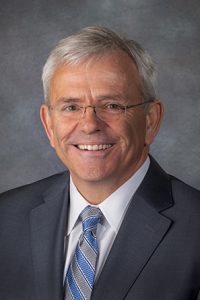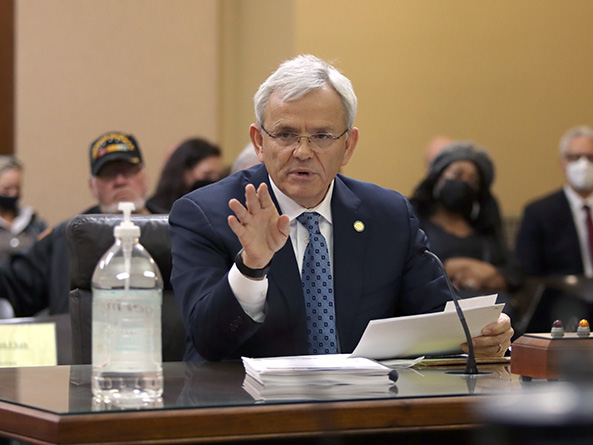Criminal justice reform measure discussed
A bill that would enact a series of measures intended to reduce Nebraska’s inmate population and lower recidivism rates was heard by the Judiciary Committee Jan. 26.

LB920, introduced by Omaha Sen. Steve Lathrop, chairperson of the committee, would enact a number of provisions intended to improve Nebraska’s criminal justice system, including creating a criminal justice oversight task force, reducing charges for certain felony offenses and discouraging the use of mandatory minimum sentences.
Provisions of the bill are based on recommendations from the Criminal Justice Reinvestment Working Group, Lathrop said, and offer potential alternatives to investing in the construction of a new state prison.
Lathrop said Nebraska is one of four states that saw an increase in its prison population between 2009 and 2019. This was in part the result of enacting mandatory minimum sentences, he said, which have doubled in use since 2011 and have significantly increased sentence lengths.
If the state’s prison population continues to grow as expected, he said, Nebraska will be in an overcrowding crisis again – 1,300 beds short of operational capacity – by 2030 even with a new prison.
“We cannot build our way out of this problem … and the only way we can make progress on the overcrowding emergency is to address it through some sort of sentencing reform,” Lathrop said.
The bill contains a number of provisions designed to address sentencing, reentry, release and supervision, including:
• requiring each judicial district to establish a problem-solving court;
• reducing potential penalties for some drug and burglary offenses;
• creating three probation system pilot programs;
• limiting minimum terms for certain felonies;
• limiting offenses that can be used for certain sentence enhancements;
• limiting when courts may impose consecutive sentences;
• providing for geriatric parole, streamlined parole and earlier parole eligibility for some inmates; and
• creating a residential housing program for parolees who commit technical violations.
Tom Riley testified in support of LB920 on behalf of the Nebraska Criminal Defense Attorneys Association. Riley said the “tough on crime” mentality isn’t working and prisons continue to become overcrowded due to mandatory minimum sentences.
“There is no increase in people coming in but the population is going through the roof and the reason, in my opinion, is mandatory minimums,” he said. “They serve no purpose whatsoever other than pure punishment.”
Also in support of the bill was Joe Nigro, who testified on behalf of the Lancaster County Public Defender’s Office and the Nebraska Criminal Defense Attorneys Association. Eighty percent of the drug cases his office works are possession cases, Nigro said, and LB920 would reduce a possession charge of a half a gram or less for most controlled substances to a misdemeanor.
“With this change, about half of our possession cases would become misdemeanors,” Nigro said. “This change would reduce our prison population. The bigger issue is: why should we treat a health problem as a felony?”
Spike Eickholt testified on behalf of the ACLU of Nebraska and the Criminal Defense Attorneys Association in support of the bill. Fewer inmates currently are eligible for parole due to the “stacking” of sentences under consecutive sentence options and mandatory minimums, he said.
In addition, Eickholt said, inmates are being denied parole because they have not completed required programming due to a shortage of resources resulting from the state’s overcrowded prisons.
Speaking in opposition to the bill was Aaron Hanson, who testified on behalf of the Omaha Police Officers Association. People want to be safe, he said, and studies show that Nebraskans support investing in a new prison.
“We’ve underbuilt and we have less beds per capita, and that’s why we are significantly overcrowded,” he said. “We’ve also underinvested in prison rehabilitation.”
Col. John Bolduc testified on behalf of the Nebraska State Patrol in opposition to two provisions of LB920. He said that reducing some drug possession charges to misdemeanors and removing the mandatory minimum requirement for certain felonies ultimately would harm the people those penalties are meant to protect.
“These drugs are dangerous not only for the users, but for their families, friends and for their communities at large,” Bolduc said. “The elimination of the mandatory minimum sentences for Class ID and IC drug-related felonies automatically reduces the protection afforded to communities from some of the most serious drug offenders.”
Also in opposition to LB920 was Elaine Menzel, testifying on behalf of the Nebraska Association of County Officials. While supportive of problem-solving courts and mental health resources, Menzel said, the organization opposes reducing drug penalties and mandatory minimums for certain nonviolent crimes.
The committee took no immediate action on LB920.


